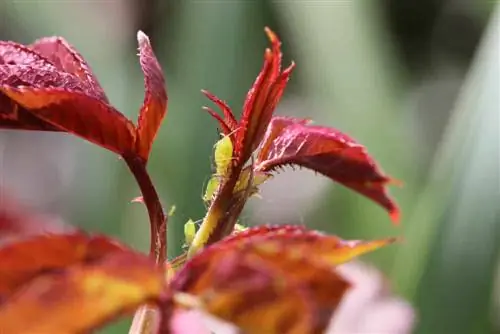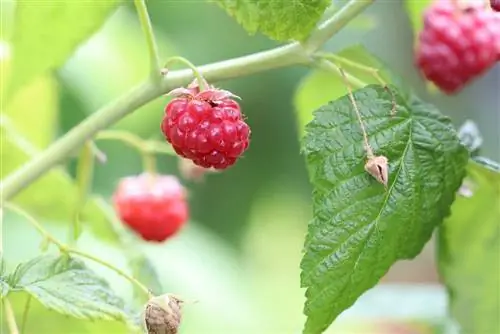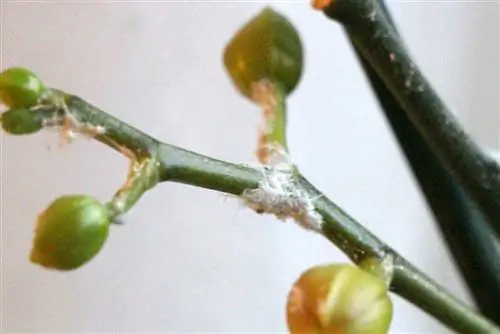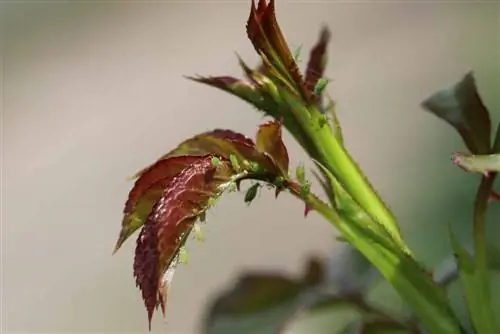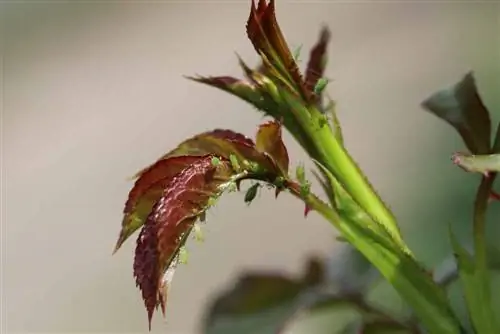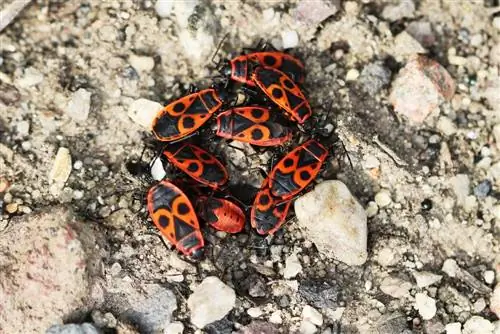- Author admin [email protected].
- Public 2023-12-17 03:39.
- Last modified 2025-01-24 12:45.
Orchids are the most noble flower for many, but unfortunately for many aphids they are a real treat. Once they have arrived on the Orchidaceae, they should not be underestimated. The plant usually reacts very sensitively to these pests and the damage caused often leads to the death of this wonderful plant species. If the aphid is discovered quickly, effective control agents help to kill or drive it away and keep the plant alive without serious damage. Here you will find out the most effective methods and how you can use them.
Detection
So that you can react correctly to an aphid infestation, you should find out exactly how to recognize this pest in advance. The following features make identification easier:
- Pinhead pin-sized bodies around two millimeters in diameter
- Color: Light green or black
- Mostly stick to the stems and trunk in colonies
- Sticky film (honeydew) on the leaf stems, undersides of leaves and sometimes the flower buds
- Brown coloring of the leaves
- Leaf stunting in advanced stage
- Closed buds fall off
Chemical control
Chemical control agents are available from specialist retailers specifically for sensitive orchids. But depending on the product quality, these can also cause damage to the Orchidaceae. Apart from that, these are usually environmentally harmful products and ingredients that cannot be broken down naturally.
In addition, chemical controls against aphids often cause he alth reactions in people. For example, in an asthma patient, the risk of attacks can increase, cause nausea and headaches, or irritate the mucous membranes. A very common chemical insecticide is the so-called pyrethroid. According to studies, this can, in the worst case, disrupt the hormonal balance and even lead to impotence in men.
For these reasons, you should not use chemical insecticides, but rather use natural, non-toxic products that have proven their effectiveness in numerous practical tests over the years. But simple home remedy recipes also promise successful control of aphids on orchids without damaging them or putting additional strain on them.
First aid measure
As soon as you have the first suspicion that there may be aphids on your orchid, you should immediately isolate them from other plants. You can also wash away some aphids with a strong shower. But be careful, the water pressure must not be too strong, otherwise it could damage the fine structure of the Orchidaceae.
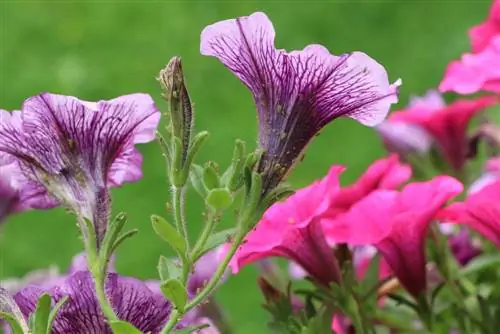
We recommend an average water pressure of around five bar, as is usually the case in a normal household. If you discovered the aphids early, with a little luck you will have gotten rid of the pests before they have had a chance to multiply countless times on the plant. After successfully showering, keep the orchid away from other flowers for a few days to be sure that there are no more aphids present.
However, if the infestation is more severe, a shower only helps in preparation for further control measures.
Collect
This type of plant is particularly suitable for classic collecting. Thanks to their stalky structure and the thin leaf cover, the places preferred by aphids are easy to reach. Collecting works best if you proceed as follows:
- Place your thumb and index finger at the base of the affected stems and leaves
- Press your fingers together slightly when the affected part of the plant is between your fingers
- Use light pressure to guide your fingers up the part of the plant or along the leaf to the tip of the leaf
- Depending on the number of aphids, occasionally wipe off any aphids that are stuck to your fingers on a kitchen paper towel
- Repeat several times if necessary
- Ideally, every part of the plant is worked on with your fingers
- It may be necessary to follow up with another control method
Tip:
Do not dispose of collected aphids in the compost because they usually find excellent conditions for reproduction here. So always dispose of it with household waste.
Plant protection preparations
There are numerous plant protection products available on the market that work without poison and are made on an organic basis. Especially when it comes to orchids, you have to make sure that you buy a preparation specifically made for this type of plant, which is available in well-stocked hardware stores or garden shops. Due to the sensitivity of this plant species, organic products can also attack the substance, depending on the ingredients. The products produced especially for you usually contain, in addition to the non-toxic natural active ingredients, ingredients to strengthen orchids. These preparations ensure that the plant, which has already been weakened due to aphids, receives more strength and energy through the supply of nutrients and minerals. This makes it more resilient and recovers better from pest infestation.
Beneficial insects
A very natural and even nature-promoting method of combating aphids are so-called beneficial insects. These are certain small insects that feed on aphids. When exposed to the orchid, depending on the beneficial insect, they can eat all the pests within a day. Ladybugs and their larvae are among the hungriest insects, eating between 400 and 800 lice every day. Lacewings eat up to 500 aphids per day.
You can get beneficial insects from specialist retailers. Most of the time they are not in stock and have to be ordered. Until it arrives, you should keep your infected plant in isolation, shower occasionally and place it on the balcony or terrace in warm weather. With a little luck, beneficial insects will discover this food source.
Tip:
You can lure beneficial insects into your garden or onto the balcony as a preventive measure. Simply set up a so-called insect hotel and give your orchids a few hours of sunshine every day next to it.
Home remedies
Simple home remedies are becoming increasingly popular and are often replacing expensive commercial products with the same or almost similar effect. There are countless tips and tricks on the internet on how you can easily get rid of aphids on orchids. Unfortunately, more is often promised than delivered. However, the following home remedy recipes have already proven themselves in the long term, so they can be recommended as effective methods of combating aphids on sensitive orchids.
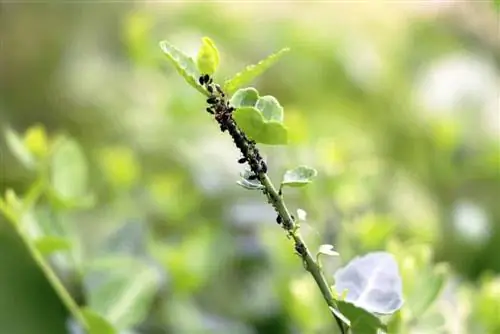
Nettle broth
- Collect around 1 kilogram of nettles
- Press these into a bucket filled with 10 liters of water
- Let it soak in the water for a day
- Sifting out nettles
- Pour the remaining broth into a spray bottle
- Spray the plant generously with the broth
- Alternatively, rub plant parts with the nettle broth
- Repeat the process every two days for a week
Soap suds
- Dissolve a tablespoon of soap in a liter of water
- Use only potash or neutral soap without additives
- Pour lye into a spray bottle with a dash of spirit (spirit increases the effect)
- Spray the plant completely until it is dripping wet
- Additionally wipe leaves and stems with the lye
- Spray again every three days, but now only lightly and without alcohol until all the aphids are gone
- After successful treatment, shower the orchid well with clean water
- Afterwards it can be put back in its usual place
Rapeseed oil-water mixture
- Mix 30 milliliters of rapeseed oil with 70 milliliters of water
- Pour mixture into a spray container
- Spray the plant generously
- Repeat after 24 hours if necessary
- Wipe off dead animals with household paper or an old rag
- Shower the plant to remove rapeseed oil residue
Rapeseed oil causes the respiratory tract of aphids to stick together and cause them to suffocate. Make sure that you only prepare as much of the rapeseed oil mixture as you need for one application. A new mixture must be freshly prepared for each further application.
Powder methods
A treatment with wood ash and/or rock dust is very environmentally friendly and effective. To do this, pour generously over the Orchidaceae and work some of it into the soil. Wood ash and/or rock dust should be mixed in, especially in the area of the roots. Like rapeseed oil, these two natural substances block the respiratory tract and the aphids die within a few hours.
The disadvantage of these powder methods, however, is that the fine substances fly through the air and can also close the respiratory tract of other animals. Therefore, when using it, you should ensure that there are no beneficial insects in the immediate vicinity. If this cannot be prevented, this type of control against aphids on orchids should be avoided.
Prevention
The best way to combat plant lice is prevention. Here you can choose from a few methods that will keep aphids away from your magnificent specimens and protect them against infestation by these parasites in the long term.
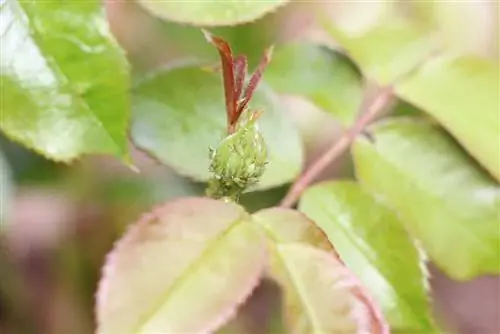
Fertilization
However, what is very good for the Orchidaceae is also something the aphid particularly likes: nitrogen. This nutrient ensures strong shoot growth and juicy leaves in this type of plant, which represent an “a la carte” meal for these pests. They attract the small parasites. Try to use a fertilizer that contains less nitrogen or reduce the fertilizer dose so that the leaves still remain lush green, but develop less leaf flesh.
Herb deterrent
Your fresh herbs are probably in the kitchen or outside in the herb bed or in a herb box on the balcony. These are places where orchids are usually not located. However, you can use the scent of various herbs to deter aphids from attacking your flower, even if herbs are not placed directly next to them. Simply cut fresh herb branches once a week and place them on the orchid soil.
The following herbs have a deterrent effect against aphids:
- Lavender
- Thyme
- Sage
- Savory
By the way, you can also work with garlic and onion peels and mix them into the potting soil. However, this variant is only recommended in summer when the flower is outdoors. In closed rooms the smell could be perceived as pleasant.
Watering water
Make a decoction of garlic and onion peels and water your orchid occasionally. The brew is prepared as follows:
- Boil 2 garlic cloves and 200 grams of onion peels in a liter of water
- Then let it steep for an hour
- Let the brew cool down
- Pour 1/2 cup of brew into a liter of water
- Use only lime-free irrigation water
- As a preventive measure, the decoction should be added to the irrigation water at least every four weeks
Conclusion
Aphids can play havoc with an orchid and, if the infestation is not de alt with, can cause the plant to die within a very short time. Chemical insecticides work quickly, but usually pose he alth risks for you and others. Natural methods and tried-and-tested home remedies are better, as they usually require a little patience to take effect, but they have less or no impact on the environment, you or the orchidaceae. Above all, it is important that you recognize the pests as aphids early on and react immediately to stop further damage and the spread of the parasites.

